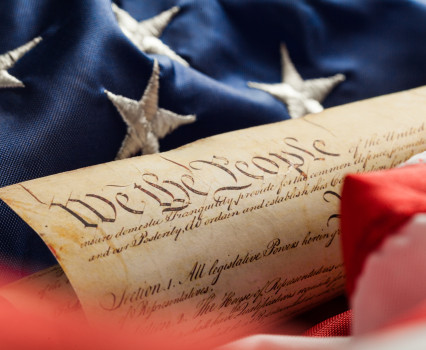In order to form such a complex and well-thought-out constitution, there must be years of theories and philosophies behind the democracy supporting the certain ideologies carried within the government.
Determining what type of power shall be bestowed upon the government is alone a process that will require years of studying and wisdom in order to pursue the correct foundation for the citizens of this democracy.
Theorists and philosophers who helped the United States when developing their constitution were two English philosophers by names of Thomas Hobbes and John Locke, these two shared opposing ideas in the way human nature should be governed and how human nature is naturally.
These two great minds meshed together helped form a constitution that would soon reach amelioration in the forming government in the United States.
Thomas Hobbes’ graduated in 1608 from Oxford and began to utilize his knowledge by then working as a tutor for a Cavendish family, while working he would take voyages to obtain more knowledge and study with other widely known philosophers such as Rene Descartes (Sailus 2).
Most of Thomas Hobbes’ ideas were influenced by his current situation in his government, during the writing of his well-known book, The Leviathan, his own parliamentary was undergoing a brutal and chaotic civil war the led to the beheading of King Charles I (Sailus 2).
Hobbes’ views in his novel are greatly influenced by the poor monarchy that was in power as well as the brutal nature of citizens in the country. In Hobbes’ new novel he discusses this theory that the natural human state is to be quarrelsome and in need of a strong government to control and restrict these brutal urges (U.S History.org 5).
His ideas inspired other philosophers to question the sole ideology about absolute monarchy, Montesquieu was influenced to question Hobbes’ beliefs and developed the separation of powers process that later Americans would adopt into their system (U.S History.org 5).
John Locke also attended Oxford university where he studied the works of Rene Descartes and the fields of medicine (Celine 2). It was the publication of the novel, Two Treatises of Government, that influenced and popularized some of his ideas on the human nature and government, this will greatly impact the U.S. constitution when in the making.
John Locke opposed the idea that human nature needed a strong monarchy in order to be maintained, his beliefs were much more positive about the perspective on democracy. Locke suggested that the government’s participation in being a leader is to protect the natural rights of their citizens (U.S History.org 6). His ideas on life, liberty, and property are 2 of the most influential ideas that will later help Thomas Jefferson form one of the most important and crucial rights from the Declaration of Independence (U.S. History.org 6).
How both of these philosophers influence the U.S. democracy is by their sole beliefs, written works on the human nature, and the type of government that needs to be in place in order to control this natural human urge. In Hobbes’ studies, he fights for a position that in order to control the self-centered nature of humans, they must be under strict control with a strong leader who will demonstrate rules in all aspects.
Hobbes’ influential work in the novel, The Leviathan, are what helped develop important features of the U.S democracy such as separation of powers and perhaps even a strong law system.
Locke’s ideas differ vastly from that of no optimism in Hobbes’ look at human nature, the difference is that John looks at human nature and has trust that in a democracy they will not be abused or over-governed as they would be in a monarchy. John Locke’s beliefs are that the government should protect the people of civil rights such as life, liberty, and property; these are ideas that were soon incorporated into the Declaration of Independence. These two great philosophers helped shape the underlying important aspects of the U.S constitution.
References
Celine. “Difference Between.” Difference Between Similar Terms and Objects. N.p., 21 May 2017. Web, 16 June 2017.
“Foundations of American Government.” UsHistory.org. Independence Hall Association, n.d. Web, 18 June 2017.
Sailus, Christopher. “Thomas Hobbes and John Locke political theories.” Study.com. Study.com, n.d. Web, 17 June 2017.

